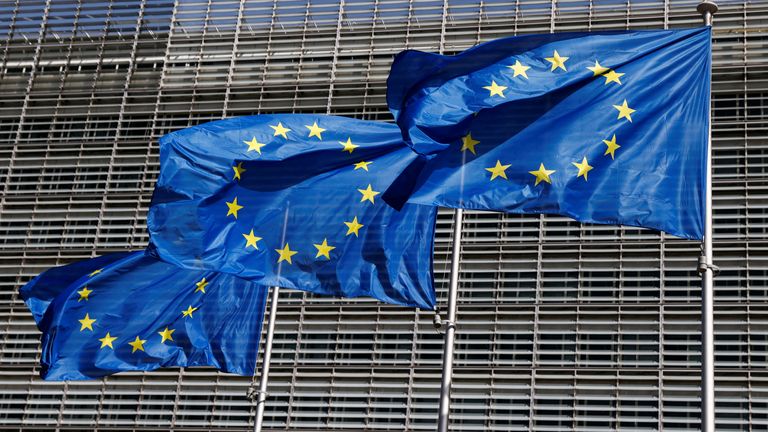Brexit will leave workers poorer than they would have been and has damaged Britain's competitiveness, new study says
The findings go on to say leaving the EU has pushed up the cost of living, seen investment fall and the UK lose market share in key areas.
Wednesday 22 June 2022 08:24, UK
Brexit has damaged Britain's competitiveness, will reduce productivity and leave the average worker poorer than they otherwise would have been, according to a new study.
The Resolution Foundation said leaving the EU has reduced how open and competitive Britain's economy is.
And it goes further to say it has also led to an increase in cost of living and the level of business investment falling.
The report, in collaboration with the London School of Economics, said this was all as a result of a "depreciation-driven inflation spike" following Brexit.
However, new post-Brexit trade rules, which took effect in January 2021, unexpectedly did not lead to as persistent a fall in British exports to the EU that many predicted, although imports from the EU have fallen more swiftly than those from the rest of the world, the study suggested.
It said Britain has experienced a decline of 8% in trade openness - trade as a portion of economic output - since 2019, losing market share across three of its largest non-EU goods import markets in 2021, the US, Canada and Japan.
The full effect of the Trade and Cooperation Agreement will take years to be felt but the move towards a more closed economy, say the authors, will make the UK less competitive, which will reduce productivity and real wages, it was predicted.
The research estimated that labour productivity will be reduced by 1.3% by the end of the decade by the changes in trading rules alone, contributing to weaker wage growth, with real pay set to be £470 per worker lower each year, on average, than it would otherwise have been.
North East hardest hit
Output of Britain's relatively small but high-profile fishing industry - many of whose members advocated strongly for Brexit - is expected to decline by 30% and some workers will face "painful adjustments", said the foundation.
The report added the North East is expected to be hit hardest by Brexit as its firms are particularly reliant on exports to the EU.
Read more:
Long shadow of Brexit is darkening UK-EU relations as negotiations remain stalled
Sophie Hale, principal economist at the Resolution Foundation, said: "Brexit represents the biggest change to Britain's economic relationship with the rest of the world in half a century.
"This has led many to predict that it would cause a particularly big fall in exports to the EU, and fundamentally reshape Britain's economy towards more manufacturing.
"The first of these has not come to pass, and the second looks unlikely to do so. Instead, Brexit has had a more diffuse impact by reducing the UK's competitiveness and openness to trade with a wider range of countries.
"This will ultimately reduce productivity, and workers' real wages too.
Not just teething problems
"Some sectors - including fisheries - still face significant change to come in the years ahead, but the overall services-led nature of the UK economy will remain largely unaffected."
Britain's fishing industry was likely to shrink by 30% due to difficulties exporting its fresh catch to EU customers, the report said.
Hilary Benn, Labour MP and co-convenor of the UK Trade and Business Commission, said the government's Brexit deal was "making businesses and consumers poorer at a time when people up and down the country are struggling to make ends meet".
He said the report proved these were not just "teething problems" either but a "long-term economic problem" and called on minister to review the deal.
Britain's government said in response to the report that it is working on new legislation to boost growth, and that trade
with the EU is now above pre-pandemic levels.
"Since we left the European Union, we have begun seizing new opportunities to improve UK regulation for businesses and consumers through plans to enhance competition and harness new technology," a spokesperson said.





